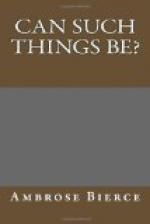action of some controlling part—an effect
such as might be expected if a pawl should be jostled
from the teeth of a ratchet-wheel. But before
I had time for much conjecture as to its nature my
attention was taken by the strange motions of the
automaton itself. A slight but continuous convulsion
appeared to have possession of it. In body and
head it shook like a man with palsy or an ague chill,
and the motion augmented every moment until the entire
figure was in violent agitation. Suddenly it
sprang to its feet and with a movement almost too
quick for the eye to follow shot forward across table
and chair, with both arms thrust forth to their full
length—the posture and lunge of a diver.
Moxon tried to throw himself backward out of reach,
but he was too late: I saw the horrible thing’s
hands close upon his throat, his own clutch its wrists.
Then the table was overturned, the candle thrown
to the floor and extinguished, and all was black dark.
But the noise of the struggle was dreadfully distinct,
and most terrible of all were the raucous, squawking
sounds made by the strangled man’s efforts to
breathe. Guided by the infernal hubbub, I sprang
to the rescue of my friend, but had hardly taken a
stride in the darkness when the whole room blazed with
a blinding white light that burned into my brain and
heart and memory a vivid picture of the combatants
on the floor, Moxon underneath, his throat still in
the clutch of those iron hands, his head forced backward,
his eyes protruding, his mouth wide open and his tongue
thrust out; and—horrible contrast!—upon
the painted face of his assassin an expression of
tranquil and profound thought, as in the solution
of a problem in chess! This I observed, then
all was blackness and silence.
Three days later I recovered consciousness in a hospital.
As the memory of that tragic night slowly evolved
in my ailing brain recognized in my attendant Moxon’s
confidential workman, Haley. Responding to a
look he approached, smiling.
“Tell me about it,” I managed to say,
faintly—“all about it.”
“Certainly,” he said; “you were
carried unconscious from a burning house—Moxon’s.
Nobody knows how you came to be there. You may
have to do a little explaining. The origin of
the fire is a bit mysterious, too. My own notion
is that the house was struck by lightning.”
“And Moxon?”
“Buried yesterday—what was left of
him.”
Apparently this reticent person could unfold himself
on occasion. When imparting shocking intelligence
to the sick he was affable enough. After some
moments of the keenest mental suffering I ventured
to ask another question:
“Who rescued me?”
“Well, if that interests you—I did.”
“Thank you, Mr. Haley, and may God bless you
for it. Did you rescue, also, that charming
product of your skill, the automaton chess-player
that murdered its inventor?”
The man was silent a long time, looking away from
me. Presently he turned and gravely said:




